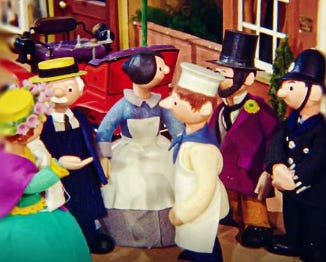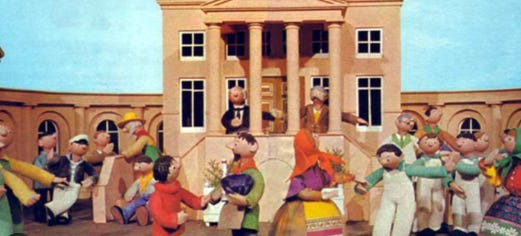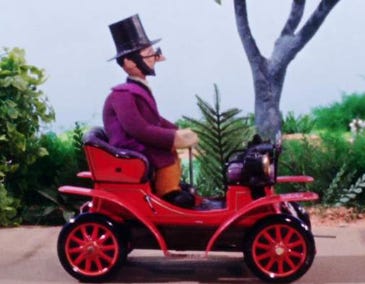A British Classic that forms part of a trilogy
This week I look at the stop-motion world of Chigley
A Nostalgic Journey into Chigley
Welcome to my weekly newsletter, all about animation, from blockbusters to lesser-known cartoons. Every week, I provide an informative piece of animation history to widen your cartoon horizons.
History
Chigley, part of the iconic children's television series "Trumptonshire Trilogy," first graced the small screen in the late 1960s. The series was created by Gordon Murray as a follow-up to Camberwick Green and Trumpton, forming a trio of charming stop-motion animated shows that captured viewers' hearts in the UK.
Although first aired in 1969 and only ever making 13 episodes, the show went on to be broadcast up until the 1980s and, like its two stable mates Camberwick Green and Trumpton, went on to support breakthroughs in stop motion that are still used today by some of the big studios.
Plotline
Set in the fictional village of Chigley, the animated series revolves around its endearing inhabitant's daily lives as their adventures unfold. This all offers a glimpse into the tight-knit community and the diverse activities, from the local bakery to the bustling Chigley Paper Mill. Each episode weaves a simple yet captivating tale, often imparting moral lessons and showcasing the importance of cooperation and friendship.
The heart-warming simplicity had the village biscuit factory as the villagers' primary source of employment, which also formed part of the plots of the character's lives.
Characters
Chigley introduces a cast of memorable characters, each with its distinct personality. From Lord Belborough, the affable owner of Chigley Paper Mill, to Mr Swallow, the diligent station master, every character contributes to the village's vibrant tapestry. The series' character-driven narratives fostered a sense of familiarity, endearing these animated figures to generations of viewers.
Merchandise
Despite its vintage origins, Chigley has left an enduring mark on the merchandise world. Beloved characters have graced various products, including toys, books, and collectables. The timeless appeal of Chigley's quaint charm continues to resonate with fans, making memorabilia a cherished part of many nostalgic collections for fans of the show.
A vinyl album of all the music was also released at the height of the series, which had all the songs from all three shows. Even now, there is a collector’s market for books and annuals of the show.
Around the World
While Chigley has its roots in British television, its gentle storytelling and universal themes have transcended geographical boundaries. The series found audiences worldwide, captivating viewers with its timeless charm. The depiction of community spirit and everyday adventures resonated with diverse cultures, making Chigley a small but cherished part of the global stop-motion landscape.
Fun Facts
Chigley, along with its Trumptonshire Trilogy counterparts, gained popularity for its unique stop-motion animation technique known as stop-frame, contributing to the distinctive look and feel of the series.
The series' catchy theme song, "Time Flies By When I'm the Driver of a Train," became synonymous with Chigley and remains a nostalgic anthem for fans.
Chigley, Camberwick Green, and Trumpton were re-released on DVD in the 2000s, introducing a new generation to the timeless charm of these classic animated series.
As of 2019, NBCUniversal has the rights to all three shows.
Conclusion
Chigley is a quietly impressive chapter in the history of children's television, offering a delightful journey into the heart of a quaint village and its lovable inhabitants. With its enduring appeal, the animated series continues to evoke fond memories and captivate audiences of all ages, showcasing the timeless magic of stop-motion animation.
Coming Up
In March, I am writing a series of weekly essays looking at cultural aspects of animation and how it has influenced popular culture and vice versa.
All this for free, you ask, well of course…Tell your friends







Great post Jon. Looking forward to your upcoming pieces, they sound interesting!
This is where British animation differs from its American cousin- far less frantic and surreal in nature, and all the better for the topics it deals with.